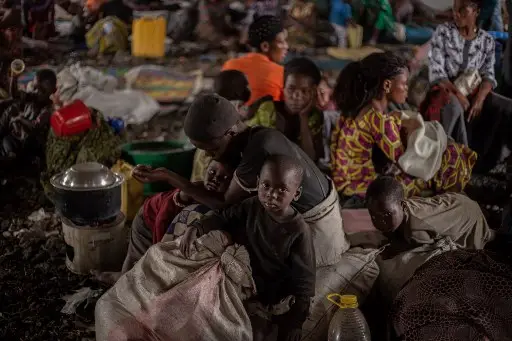GENEVA, Switzerland—The eastern region of the Democratic Republic of Congo (DRC) is grappling with a worsening humanitarian crisis, as relentless violence has forced over 237,000 people to flee their homes since the beginning of the year, the United Nations Refugee Agency (UNHCR) reported Friday.
Speaking at a press briefing in Geneva, Eujin Byun, UNHCR spokesperson, highlighted the dire situation in North and South Kivu provinces, where clashes between armed groups and the Congolese military continue to devastate communities. “This crisis is one of the most severe yet remains largely under-reported,” Byun stated, describing the conflict as being characterized by egregious human rights abuses and large-scale forced displacement.
Regions Under Siege
The UN estimates that North and South Kivu already host 4.6 million internally displaced people, making the DRC one of the most heavily burdened nations in terms of internal displacement. The region’s longstanding instability has been compounded by the resurgence of the Rwanda-backed M23 rebel group, which has captured significant territories since 2021. Earlier this month, the group seized Masisi, a key administrative center in North Kivu.
Recent fighting in the Masisi and Lubero territories displaced an estimated 150,000 people in less than a week, Byun noted. Thousands who initially fled to Masisi territory for safety were forced to move again as violence spread. Meanwhile, South Kivu’s Fizi territory has seen approximately 84,000 people displaced, according to local government reports.
A Crisis of Unprecedented Scale
“Entire communities are caught in the crossfire,” Byun warned. Civilians are enduring indiscriminate shelling, forced recruitment by armed groups, and widespread sexual violence. The use of heavy weaponry has resulted in countless civilian casualties, including children, while the presence of armed actors has obstructed humanitarian efforts.
Compounding the crisis, displaced individuals face dire living conditions with limited access to food, clean water, and medical care. Roadblocks, ongoing violence, and a lack of resources have further restricted aid deliveries.
Temporary Respite Turns Tragic
Byun recounted the harrowing experiences of displaced communities in Masisi-Center. After a brief lull in fighting earlier this month allowed around 25,000 people to return, renewed violence forced them to flee again. Armed groups reportedly commandeered civilian homes for shelter, blurring the line between combatants and non-combatants and putting innocent lives at greater risk.
Urgent Appeal for Assistance
The UNHCR has called for immediate international support to address the escalating crisis. The agency requires $226 million to provide life-saving assistance in the DRC this year but has received less than 10 percent of the necessary funding. “Without additional resources, we cannot meet the growing needs of these vulnerable populations,” Byun stressed.
The eastern DRC, rich in natural resources yet mired in decades of conflict, remains one of the world’s most neglected humanitarian crises. As violence intensifies, the displaced population faces an uncertain future, with the global community being urged to act swiftly to prevent further suffering.

